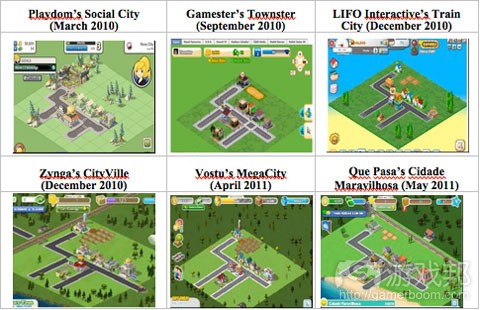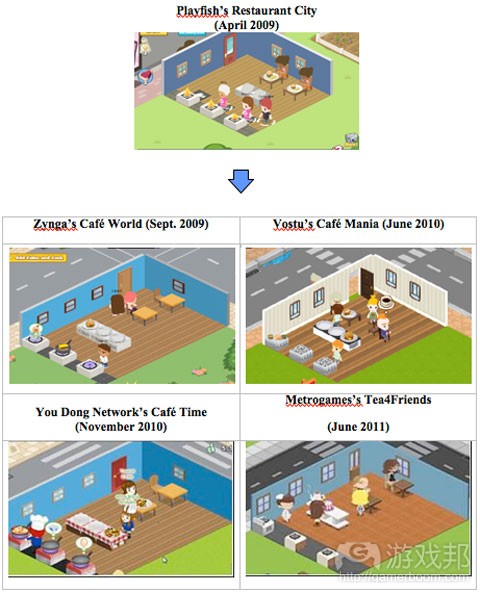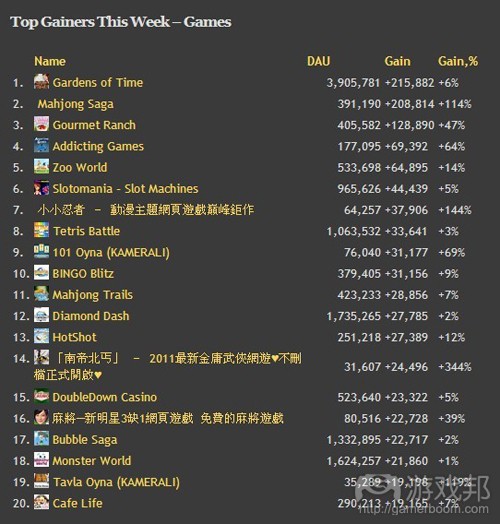每日观察:关注Wooga进军手机游戏市场(7.21)
1)德国社交游戏开发商Wooga日前也宣布进军手机游戏领域,将于今年夏天推出iOS版本的《Diamond Dash》(游戏邦注:它是Facebook第十大热门游戏)。该公司在Facebook已有3500多万MAU,仅次于Zynga的2.76亿MAU,以及EA加PopCap Games的4900万MAU,成为Facebook排名第二的社交游戏公司。
《Diamond Dash》当前每月用户超过1000万,Wooga在过去一年的活跃用户也增长了300%,并计划开发基于HTML5的手机游戏,实行跨平台发展战略。
2)PopCap近日再向Facebook推出一款可爱风格的游戏《Pig Up!》。玩家在游戏中的任务是从一个大炮中发射一只无助的小猪,如果小猪飞得越远,玩家得到的分值就越高。玩家可以使用虚拟货币Pig Pence购买盔甲和火箭包等道具加速游戏进程。
该游戏设置了积分排行榜等社交功能,支持玩家与好友比较分数。《Pig Up!》目前还处于预演阶段,仅在Facebook提供限时体验(游戏邦注:据AppData数据显示,该游戏目前的MAU已超过500)。
3)Playdom日前在YouTube发布一个视频预告片(长度仅13秒钟),但除了“Galaxy of Wonder”和“Coming soon”的字眼,并没有展示其他具体内容。有人猜测,“Galaxy of Wonder”或许有可能是《City of Wonder》的扩展内容(就像《FrontierVille》中的Pioneer Trail一样),但也有人认为它是一款全新的游戏。
4)据《纽约时报》报道,在六月份被Zynga起诉侵犯版权之后,巴西社交游戏开发商Vostu于近日奋起还击,反诉“Zynga并不享有谷仓、农场和椅子等游戏物品的版权”,并称Zynga过去也克隆了许多其他游戏的设计。
从Vostu提交的材料中可以看出,自Playdom在2010年3月发布的《Social City》开始,社交游戏领域就已出现大量城市建设题材的克隆产品,其中还涉及Quepasa和Gamester等多家公司(如上图所示)。至于餐厅主题的同质化游戏更是层出不穷,除了Playfish的《Restaurant City》之外,Zynga、Vostu、You Dong Network和Metrogames也都推出了相似的咖啡馆游戏(如下图所示)。观察者认为Vostu这一举动与其说是在自证清白,不如说是为了反证Zynga也难逃侵犯他人版权的嫌疑。
5)拉美社交游戏网络Guepasa日前宣布以1亿美元(8200万美元的普通股,外加1800万美元的现金)收购社交平台MyYearbook。这两者结合后共有7090万用户,以及3360万美元的合并收益,每月40亿次的广告印象(其中10亿次来自手机平台,另外30亿次来自网页)。
Quepasa打算将MyYearbook的工具运用于扩大现有业务的粘性和盈利,该公司旗下还运营着社交游戏工作室Quepasa Games,除了面向Quepasa.com发布游戏之外,其作品还登陆了Orkut和Facebook平台。MyYearbook在2010年的营收为2370万美元,其首席执行官Geoff Cook将担任Quepasa公司首席运营官兼用户网络部门总裁,并加入公司董事会。
6)Gaia Interactive最近宣布与韩国社交游戏开发商Fever Studio合作,将把本土化游戏《Everytown》推向Facebook(游戏邦注:《Everytown》是韩国热门社交网络中最受欢迎的游戏),并利用在线社交社区Gaia Online的运营经验,合作推出更多新款社交游戏。
Gaia Online上线已有8年之久,至今仍然广受用户欢迎,Gaia Interactive在去年底向Facebook推出了社交游戏《Monster Galaxy》,该游戏在高峰期的MAU曾达到1900万,目前也仍有1490万的活跃用户。
7)据市场调研公司Experian Hitwise观察,截止7月16日Google+(plus.google.com)总共仅有180万访问量,但已比之前一周增长283%。在7月14日当天的访问量更是高达31.7万次,在7月18日这天降至22.6万次。
需要注意的是,这一访问量下降发生在Google+推出iPhone应用的前一天,而该应用目前已经成为iTunes排名第一的免费下载应用。
从这一数据可以看出,尽管Google+已有1000万以上的注册用户,但仅有一小部分用户访问了该网站,而且这180万次访问量并非独立访问用户的数据。观察者认为,照此推测Google+的实际用户可能低于100万,注册一个网站帐号,并不意味着用户都会重访网站。
不过Hitwise也指出Google+现在是美国排名第42位的社交网络,在全球则位列第638名。但在之前一周它在美国排名则是2404名,可见其发展速度不容小觑。
Google+约有56%的流量来自Google相关网站,其中谷歌搜索引擎占三分之一(34%),还有21%来自电子邮件。
Hitwise还发现截止7月16日,Google+的男性用户占57%,在上周有38%用户年龄介于25至34岁之间。Google+用户主要分布在洛杉矶、纽约和旧金山等城市。
8)在本周DAU增长最快的Facebook游戏榜单上,麻将类游戏表现颇为瞩目,排名第二的《Mahjong Saga》当前DAU是39万,居于第11名的《Mahjong Trails》的DAU是42万。榜单冠军则是Playdom旗下的《Garden of Times》,当前DAU是390万。第三名是RockYou推出的《Gourmet Ranch》,DAU是40万左右。(本文为游戏邦/gamerboom.com编译,如需转载请联系:游戏邦)
1)Diamond Dash studio wooga makes move on iOS and HTML5
by Keith Andrew
Given the prevalence of DeNA, GREE, Zynga and the like, proclaiming yourself as the second largest social gaming studio in the world is a bold move.
Diamond Dash developer wooga, however, believes with 35 million users per month and the 10th most popular game on Facebook, it’s earned its place as a social gaming force.
It’s all in the numbers
Said figure, sourced from AppData.com, puts it some distance behind Zynga on 276 million.
Indeed, while wooga places itself ahead of both EA and recent purchase PopCap, if their respective figures are combined, the German studio is actually knocked into third position.
Nonetheless, wooga claims it has no plans on remaining solely tied to Facebook.
Diamond move
The developer is to take its experience on Facebook and apply it to mobile development, targeting both iOS and HTML5 as it looks to become a major player on smartphones.
First up is Diamond Dash, which will launch across iPhone and iPad this summer sporting integration with Facebook and cross-platform competition.
“We set out this year with an ambitious goal, to become the second largest social game developer on Facebook,” said founder and CEO Jens Begemann.
“As our business continues to grow, we are committed to investing in the most innovative technologies and platforms. We look forward to bringing our exciting and original game titles to a new global audience of mobile users.”
The move comes as Flash developer Arkanium also announces an intention to bring its casual line-up to smartphones, setting up a new base in Toronto to handle the operation. (source:pocketgamer)
2)Plants vs Zombies developer PopCap brings endless flying title Pig Up! to Facebook
by Anthony Usher
Busy developer PopCap has brought cute and cuddly endless running flying game Pig Up! to Facebook.
The game sees you firing a helpless piggy from a truck-mounted cannon, with the aim of travelling the farthest distance, racking up the most points, and avoiding foes.
After the initial cannon shot, you propel your piece of pork through the air by collecting apples and stars, which allow you to perform ‘flaps’ – a boost maneuver.
Using Pig Pence, the in-game currency you earn as you play, you can also buy power-ups, such as armour and rocket packs, to help you in your quest.
Three little pigs
Being a Facebook game, Pig Up! features some social elements: namely a leaderboard of your friends’ scores, which you can aim to beat in weekly tournaments.
Pig Up! is currently at the preview stage and will only be playable for a limited time. We suggest you get your rump over to Facebook now and check it out before it disappears.(source:pocketgamer)
3)Is Galaxy of Wonder Playdom’s next Facebook game?
by Joe Osborne
It looks like City of Wonder is headed for the stars. Playdom recently posted a teaser trailer to YouTube that revealed the first glimpse (and by glimpse we mean a 13-second long video clip with a logo) of Galaxy of Wonder. Aside from an official logo that cleverly throws a spaceship in replace of an “A”–and the famous words of Neil Armstrong when he step foot on the moon exactly 42 years ago–all we know about this project is that it’s “coming soon.”
Is it an expansion to its strategy game City of Wonder a’ la FrontierVille’s Pioneer Trail, or is this a new game entirely? I guess we’ll find out “soon” enough. In the meantime, go on and spend the 13 seconds it takes to learn all there is to know about Galaxy of Wonder … so far.(source:games)
4)Zynga vs Vostu: Brazilian developer fires back with a suit of its own
by Brandy Shaul
And the saga of Zynga vs Vostu continues, as Vostu, the Brazilian social game developer, has filed a countersuit against Zynga after being sued by the gaming juggernaut last June. As a recap, Zynga sued Vostu for copyright infringement, after Vostu’s MegaCity was shown to have incredibly similar designs and gameplay elements to Zynga’s CityVille, which was released four months prior.
Not willing to take these serious accusations lying down, today Vostu filed a countersuit against Zynga stating the company has no right to “claim copyright over the design of everyday objects and places, including barns, farms and chairs.” As reported by the NY Times, Vostu also goes on to call out Zynga for copying many designs from other games in the past as well.
But it’s not just Zynga or Vostu that seem to have found the copy and paste mechanic, as Vostu compiled images showing release dates and screenshots of popular city-building and cafe games. Starting with Playdom’s Social City in March of 2010, we see games from all sorts of developers, including Quepasa and Gamester, releasing similar games that all allow for the design of a fairly identical city using in-game items.
As for the restaurant games, the similarities are just as striking. Taking a cue from Playfish’s Restaurant City, Zynga, Vostu, You Dong Network and Metrogames all released similarly themed cafe games, as seen below.
While this might seem like Vostu is incriminating itself by including its own games in these comparisons, it seems instead that it’s simply trying to show that Zynga shouldn’t be allowed to throw its weight around, when it’s just as guilty of “borrowing” ideas. What’s more, Vostu’s suit claims that Zynga went so far as to entering into talks with the company over a potential partnership that would see Vostu revealing information about how Zynga could branch into the Brazilian social gaming market, but these talks quickly dissolved and Vostu was sued shortly thereafter.
While this entire legal drama seems to have spawned from the phrase “pot calling the kettle black,” it is promising to see a smaller company standing up to Zynga (and its surely massive legal team). With all of these examples to back it up, could Vostu actually turn things around and win this thing, or at least force Zynga to quietly crawl away from the courtroom? As this drama is sure to continue to unfold, we’ll make sure to let you know what comes of it.(source:games)
5)Latino social network Quepasa swallows MyYearbook
By Ryan Kim
Tweet inShare17We just wrote about the growth of social network MyYearbook, who has been on a tear as it emphasizes mobile, engagement and games. Well, the company’s growth didn’t go unnoticed by its peers. Latino social network Quepasa Corp. is announcing today that it is buying MyYearbook for $100 million, $82 million in Quepasa common stock and approximately $18 million in cash.
Quepasa encourages its Latino audience to find and flirt with each other with an emphasis on games, something MyYearbook does as well but to a mainstream U.S. audience. The merger will bring the combined total users to 70.9 million with consolidated revenues of about $33.6 million. Together, the companies have 4 billion monthly advertising impressions with 1 billion on mobile and 3 billion on the web as of last month.
Quepasa CEO John Abbott said the merger with MyYearbook, with its strong growth and product focus, will allow Quepasa to become a leader in social discovery and help drive larger growth for the combined company, particularly in mobile where it doesn’t appear to have much of a presence. Quepasa is looking to apply MyYearbook’s tools for engagement and monetization to its current business.
Quepasa currently operates a social network geared toward Latino and also operates Quepasa Games, a social gaming studio that creates and publishes titles on Quepasa.com, Orkut and Facebook. In February, it bought XtFt Games, which owns social game development studio Techfront.
MyYearbook has been growing quickly, especially on mobile where it recently hit 1 billion page views each month. It also has 1.2 billion page views on the web each month. It has grown by helping people make new friends and stay connected to each other through live games with video chat and other features. In 2010, myYearbook generated $23.7 million in revenue.
The deal is expected to close in the fourth quarter of 2011 at which time MyYearbook CEO Geoff Cook will serve as COO of Quepasa Corp. and president of its Consumer Internet Division while joining the company’s Board of Directors.(source:gigaom)
6)Gaia Interactive and Fever Studio partner to bring “new breed” of games to Facebook
by Brandy Shaul
Late last year, Gaia Interactive launched Monster Galaxy on Facebook. This monster collection game was influenced heavily by titles like Pokemon, and came with enough charming, colorful graphics and gameplay to make players want to catch them all. The game did so well that it peaked at over 19 million monthly active users, and now currently sits at a very respectable 14.9 million players.
Hoping to continue in this success with future games, Gaia Interactive has announced a new partnership with South Korean social game developer Fever Studio, that will see the companies bringing a localized version of “Everytown” to Facebook. Everytown is, as of this writing, the most successful game on the top South Korean social networks, so Gaia hopes that Facebook’s extensive user base of over 750 million users will adopt it into their gameplay schedules just as regularly. In addition, Gaia and Fever Studio plan to create a “new breed of social games” for the site, using their previous experience with Gaia Online (an incredibly active social community based around dressing up an online avatar, forums, and virtual shopping) to determine what users like and how to bring those elements to Facebook.
“With Monster Galaxy as a catalyst, we aim to integrate high-quality social gaming into everyone’s daily lives as Facebook has done for social networking,” said Charles Park, co-founder and creative director of Gaia Interactive, via a company press release. “The partnership with Fever Studio will allow us to continue to offer a unique mix of highly-creative storylines, stunning visuals and engaging game mechanics that blur the lines between serious and casual games at an accelerated pace.”(source:games)
7)Hitwise Estimates Google+ Got 1.8 Million Visits Last Week And Grew 283 Percent
Erick Schonfeld
We know that Google+ is growing like a weed, with more than 10 million registered users (some say close to 20 million now).
Experian Hitwise takes a stab at estimating the early growth of Google+. For the week that ended July 16, the Google+ domain (plus.google.com) was still tiny with 1.8 million total estimated visits. However, that number was up 283 percent from the previous week, and up 821 percent from the week before. On a daily basis, estimated visits peaked last Thursday on July 14 with 317,000 estimated daily visits. That number settled down to 226,000 by July 18th, the last day of the data set.
Before you jump to any conclusions about Google+ slowing down, note that this data ends the day before Google introduced the new Google+ iPhone app, which is currently the top downloaded free app in iTunes. I know that at least for me the mobile app drove me to use Google+ much more than before, even on the Web. (Hitwise’s data doesn’t take into account mobile apps or the mobile Web anyway). Also, a lot of the usage comes from Google’s top nav bar across its sites, AKA the Sandbar, which Hitwise doesn’t count.
Still, what can we learn from the Hitwise numbers? They suggest that despite the millions of registered users, only a small percentage are actually using the site. The 1.8 million is visits, not unique visitors, so you’d have to divide it t get to an estimate of actual users, which Hitwise does not provide. But it’s pretty safe to assume that it is less than 1 million. A few hundred thousand active users in a few weeks still isn’t bad, but it’s nowhere near the 10 million to 20 million registered user number. Anyone can register for a service. It doesn’t mean they will come back to use it.
Hitwise says Google+ is the No. 42 social networking site in the U.S., and No. 638 overall. The week before it was ranked No. 2,404 among all sites in the U.S., so it is moving up quickly.
The majority of traffic to Google+ (56 percent) is coming from other Google properties, with Google search accounting for a full third (34 percent). Another 21 percent comes from email (those email notifications seem to be working).
Hitwise also sheds some light on the gender breakdown of Google+ users, with 57 percent of them being male for the four weeks ended July 16th. Users are also getting older, with 38 percent being between 25 and 34 years old for the last week, edging out the 18 to 24 year olds who made up the largest user group the week before. The top cities for Google+ users are, in order, LA (MySpace refugees?), New York, and San Francisco.(source:techcrunch)
8)Mad Respect for Mahjong on This Week’s List of Fastest-Growing Games by DAU
By AJ Glasser
You’d think with only so many ways to play mahjong that Facebook would really only see success with one or two titles — but apparently there’s still room for more as two compete mahjong games make our list of fastest-growing games by daily active users.
And if just now you’re wondering where PopCap Games’ new Facebook title, Pig Up, is on this list, don’t. The game was in a stealth beta state that was either leaked to or tripped over by the press this week, resulting in early reviews that are only just now attracting users to the game. It has about 500+ monthly active users as of press time; we expect to see it pick up enough traffic in the next seven days to make our emerging games list next week, now that PopCap has publicly acknowledged the game’s existence and can leverage cross-promotion with Bejeweled Blitz and Zuma Blitz to drive more players to Pig Up.
Gourmet Ranch, meanwhile, continues to climb in users across MAU and DAU as RockYou rolls out new content to the game while experimenting with its ad platform. Stay tuned for an interview with RockYou CEO Lisa Marino for more details.(source:insidesocialgames)
















































 闽公网安备35020302001549号
闽公网安备35020302001549号